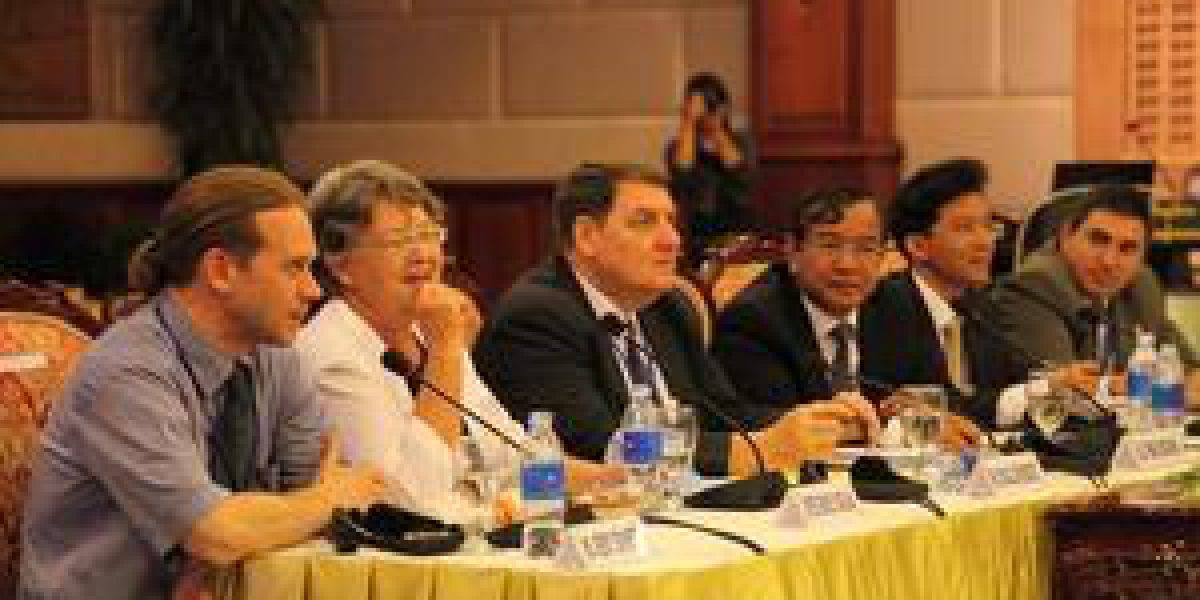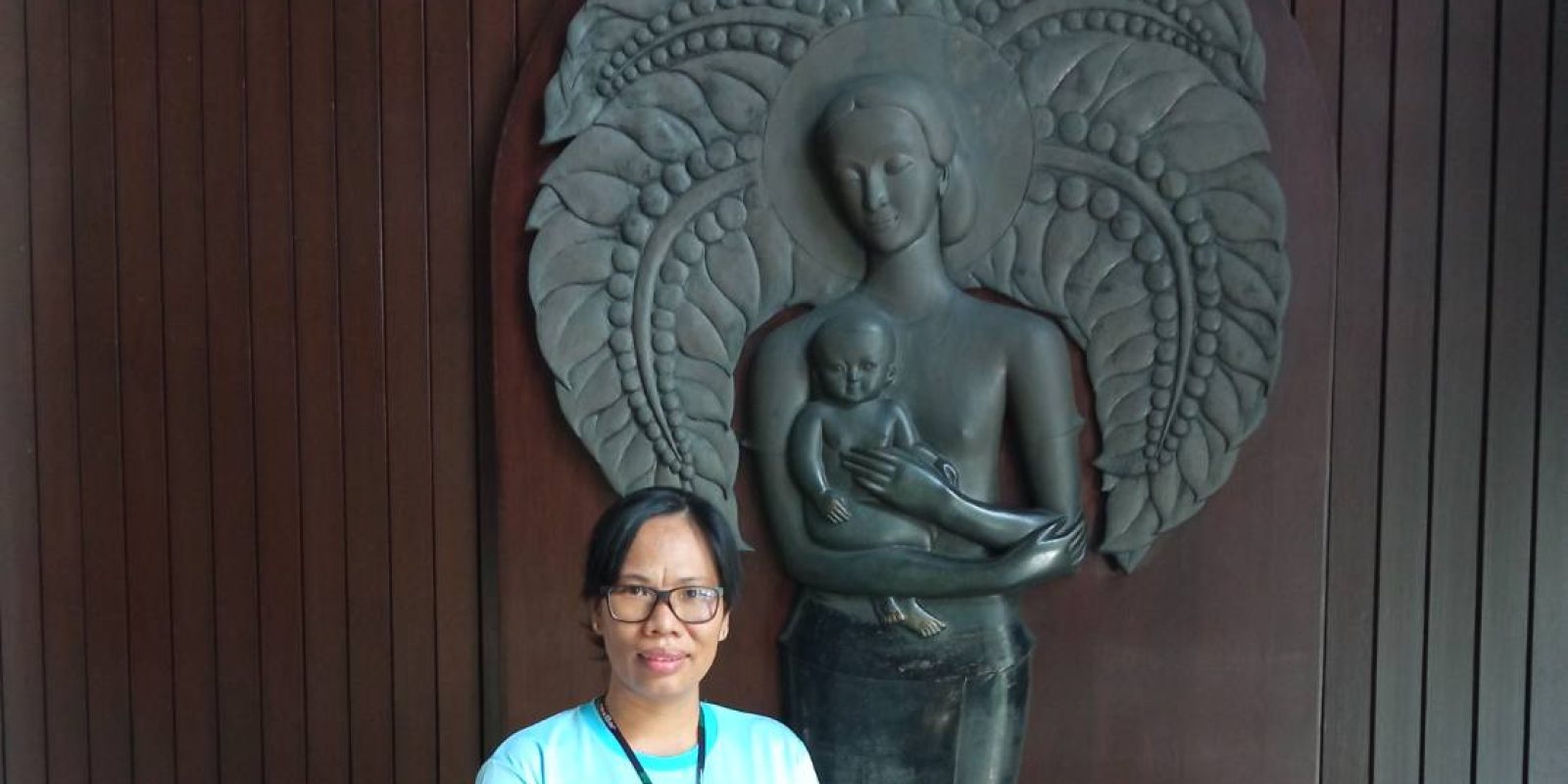Cambodia: veteran landmine campaigner seeks concrete results from UN conference
22 November 2011

Geneva, 21 November 2011 — The International Campaign to Ban Landmines recently interviewed Sr Denise Coghlan, Jesuit Refugee Service Cambodia Director – and member of the Cambodian Campaign to Ban Landmines. Sr Denise has been based in Cambodia and involved in the landmine issue and the campaign for more than 20 years.
When and how did you become involved with the ICBL?
I began working for the Jesuit Refugee Service (JRS) in 1988 in the refugee camps on the Cambodia-Thailand border. This is one of the most heavily mined areas of the world, and each day I met many people with missing legs – their legs blown off by landmines.
In 1990, JRS moved into Cambodia to promote reconciliation and peace in the midst of the Cambodian conflict. One of our programmes was working with people with disabilities from the four different factions in a vocational training centre. Many of them had been soldiers who had blown off the arms and eyes and legs of one another. As we built the centre we often discovered landmines and cluster submunitions in the soil. Here people hurt by mines and with other disabilities learned carpentry, welding, electrical skills, sculpture, agriculture and wheelchair and furniture production.
In that period there were thousands of new mine accidents. News of a concerted effort to ban landmines was in the air. In 1994, I went to a Jesuit Refugee Service meeting in Rome with coordinators from around the world. There, we decided as part of our work for refugees and returnees we would contribute to the movement that would outlaw the use of mines. The JRS priorities would be to:
- enable people affected by landmines to tell their own stories;
- ask Jesuit universities to engage in ethical reflection and bring those arguments to the movement;
- work through a national campaign structure rather than be a global presence ourselves; and
- ensure the needs of the people affected by mines were metand their rights upheld.
Around the same time representatives of the International Committee of the Red Cross (ICRC), Handicap International (HI), Mine Advisory Group (MAG), JRS and the NGO Forum met in Phnom Penh and decided we needed to push the call of the international movement on the landmine issue. We used the base of the NGO Forum which had many members.
The Coalition of Peace and Reconciliation and the Buddhist monks became very involved. The Cambodia Campaign was launched with a letter from four Banteay Prieb survivors belonging to the four different factions. This letter also launched the drive by JRS and gained more than two million signatures.
Very interesting to me was that the first call from the survivors didn’t say anything about the needs of survivors themselves but was much more focused on the communities affected, clearance of mines and a ban on use and production of mines.
.
Why did you become involved?
The situation was dire. People were suffering, people were dying. That was why I got involved. I believe that if we act together we can do much more. The fact that Jody William (first Coordinator of the ICBL) and others had already got some coordination going meant that energy could be harnessed. I also loved our survivors, Reth, Kosal, Chreuk Kheurm and grieved for the tiny ones and was inspired by the message and life of the grown ups among them. I was determined the world was going to hear what they had to say!
As an ICBL national campaigner how would you like to see states – either your country or others – Push for Progress at the 11MSP?
We would like to have a very practical conference. We don’t want a whole lot of theory but we want countries to come very honestly and say this is what we’ve done and this is what we have still to do. Maybe they’ll even say that they need to improve and we want them to tell us how. And of course I would be totally delighted if any country at the 11MSP announced that it was joining the Mine Ban Treaty or announced that it was joining the Convention on Cluster Munitions.
What message do you have for anyone out there who isn’t aware of the lethal threat landmines still pose for thousands of civilians every day?
This morning our team here in Siem Reap left on two motorbikes on a flooded village road to go to another village with a wheelchair for a man who had lost his leg to a landmine. The people who went on these bikes were four men with three legs between them. On one bike was one man with the wheelchair. On the second bike there were two men with one leg between them. These survivors were leaving here to go and help others.
Second, this week I met the man whose arm was blown up by a cluster bomb in Preah Vihear in February of this year. This man cannot forgive himself because this same submunition killed two people and injured seven others. He just didn’t know what it was.
At the same time my friend Kosal went to the hospital here and meta man who lost his hand and eye because he picked up a weapon very close to Phnom Penh. It killed his 10 year old nephew. He has his physical wounds to deal with but he also has the wounds of his heart.
Landmines and other explosive remnants of war are still causing horrible suffering in 2011.
To end with a happy story of another friend Sok Leng. At 12 years old she went to collect water for her mother. She stepped on a mine which blew off both her legs. In the aftermath of the Pol Pot era there were no prostheses. Years later she learnt to walk again and signed up to a course in Banteay Prieb and was the only woman on the course. But the night I remember was the graduation ceremony – somebody had made her a beautiful red silk dress and there she was dancing on the basketball court, legs wobbling and heart dancing.
.
Jesuit Refugee Service
The Jesuit Refugee Service is a founding member of the International Campaign to Ban Landmines (ICBL). The ICBL is a global network in more than 90 countries that works for a world free of antipersonnel landmines, where landmine survivors can lead fulfilling lives.
The Campaign was awarded the Nobel Peace Prize in recognition of its efforts to bring about the 1997 Mine Ban Treaty. Since then, JRS staff have been advocating for the words of the treaty to become a reality, demonstrating on a daily basis that civil society has the power to change the world.
Each year, some 26,000 people are killed or mutilated by landmines, which pose a severe hazard to human life in some 70 countries. People displaced by humanitarian disasters are frequently the victims of landmines during their flight and are often prevented from returning home at the end of a conflict because the presence of mines renders their roads unsafe and their fields unfarmable. The elimination of landmines is a major concern to JRS both internationally and in the United States.
Earlier this month Jesuit Refugee Service co-signed a statement by UN agencies and other organizations to the Convention on Conventional Weapons delivered by Navanethem Pillay, UN High Commissioner for Human Rights (see attached PDF). JRS International Director Peter Balleis SJ and JRS Asia Pacific Director Bernard Arputhasamy SJ will attend the Eleventh Meeting of States Parties on Mine Ban Treaty next week in Cambodia.
In the run up to the 11MSP, which is being held in Phnom Penh, Cambodia, between 2 November and 2 December 2011, the ICBL will be highlighting the amazing work of some campaigners from around the world. Read their stories in their own words and how they are working hard to Push For Progress towards a mine free world.
Interview by The International Campaign to Ban Landmines. For more information about the ICBL, please visit their website.


